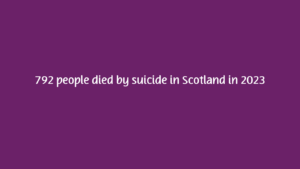
Fiona Brown
Communications Officer
6 things you should know about our suicide bereavement pilot
We know that one in ten people who lose a loved one to suicide may make an attempt on their own life.
And so, in August 2021, we launched a new pilot project to support people bereaved by suicide.
Currently being trialled in Ayrshire & Arran and Highland NHS health board regions, our Suicide Bereavement Service has provided support to dozens of people over the last year.
An independent evaluation of the project has identified the importance of the service with those who have been supported saying this would like to see the service continue.
Gillian Mcleod works for Penumbra Mental Health and is the Assistant Support Manager for the service in Ayrshire & Arran, whilst Lara Van de Peer from Support in Mind Scotland manages the service in Highland. We caught up with them to learn more about the types of journeys that people who are bereaved go on.
Here’s six things we think you should know about the service:
Every journey is different
Every grief journey is different, uniquely complex, and deeply personal.
Referrals into our service come from a variety of places, perhaps most notably the emergency services for the most recent deaths. Both Penumbra and Support in Mind Scotland share an NHS email inbox and both teams support each other to provide the service across the two pilot areas.
The first call counts
When a family is referred to the service, they receive their first call within 24-hours.
What happens on the first call is very much led by the person that we speak to. For many the shock of suicide is simply too difficult to comprehend to start with, especially if it’s only a matter of hours since the bereavement.
People are numb, it’s just about us letting them know we’re there for them. Understandably, at times, we barely register in their mind.
For others everything can come out in that first call, because it’s a release. They realise that there is someone safe to talk to, who will listen with compassion.
There are often expectations about grief that don’t match reality, and at times our initial contact is about reassuring people we’re here and that their pain, guilt, anger and everything else they feel is normal.
Taking time
We aim to schedule a support call within seven days of our initial contact, whether that’s by telephone, video call, or a text.
Our trained practitioners provide compassionate support, but fundamentally this is about listening. The term is “person centred”. It’s about building trust, listening more than talking, and providing the right words at the right time.
We’re here to support people for as long as we are needed, because learning to live with what has happened can take a long time; yes, there are steps forward — but also backwards, too, and that’s alright.
Less practical, more emotional support
When the service was set up, we envisaged supporting people to manage some of the practical issues that need to be addressed when someone dies by suicide. That may be registering the death, planning a funeral, or speaking to the Procurator Fiscal.
But it’s turned out that we don’t really provide a lot of practical support.
Reasons for this vary, but it’s been a consistent finding across both pilot areas. What is really important, is emotional support.
Someone being there to listen to all the questions you can be left with after you lose someone to suicide; someone to say things to that you don’t feel able to share with family or friends; that normalisation is so important. It’s reassuring.
We know that one in ten people who lose a loved one to suicide may make an attempt on their own life
Emotional support is not counselling
We’re able to offer the type of support that is not available elsewhere. We can provide support immediately after a suicide to help people navigate the hugely complex emotions they are facing.
Few, if any, counselling or psychotherapy services are available until at least six months after someone is bereaved.
After a period of time, we can refer someone to counselling if it’s agreed that a counselling approach is preferred, or we can signpost on to peer support services. Our service can also work hand in hand with others.
Importantly, when people are being supported by our service, they will have the same person alongside them on their grief journey providing much needed continuity.
We’re developing new resources
Our teams also work collaboratively to identify solutions to challenges.
Although every person coming into the service has a different story, there can be similar themes and sharing these with other team members can help us to gain knowledge and understanding.
Where we see patterns, our practitioners look to create resources. We’ve been developing toolkits to help people manage their sleep, and use meditation or mindfulness to relax.
You can find out more about Penumbra Mental Health and Support in Mind Scotland on our websites.
The phone number for the Suicide Bereavement Support Service is free and confidential. Leave a message on 0800 471 4768 and we will respond within 24 hours.
This article was reproduced from the NSPLG blog spot.




